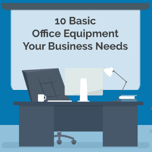- Market-Inspector.co.uk
- Small Business Trends
UK Small Business Trends 2025: Thriving in a Changing Landscape


The entrepreneurial spirit is alive and well in the UK, with the private sector boasting an impressive growth of 0.8% in 2023. More individuals than ever are leaping into small business ownership, but the road to success is paved with promising opportunities and unforeseen challenges.
While the UK economy shows signs of progress, factors like inflation and the ongoing effects of Brexit continue to cast a shadow. In this article, we’ll examine the key trends shaping the UK's small business landscape, from evolving technologies to customer preferences and a shifting workforce. We’ll also explore how entrepreneurs can navigate these changes to survive and thrive.
- Embracing technology
- Remote work and hybrid work
- E-commerce and digital sales
- Sustainability and environmental responsibility
- Business growth and statistics
- Cybersecurity for small business
- Employee mental health and wellbeing
- Google's Search Generative Experience (SGE)
- The rise of generative AI
- Nano and micro-influencer marketing
- Pay Transparency
- Sector-specific insights
- Embracing change and staying ahead
1. Embracing technology

Gone are the days of clunky filing cabinets and manual data entry. UK small businesses are rapidly embracing technology as a key driver of efficiency and innovation. Here are some of the ways technology is likely to help small businesses in the coming years:
-
Cloud solutions:
Cloud-based accounting software, project management tools, and customer relationship management (CRM) platforms are becoming the norm. These solutions offer remote accessibility, streamlined workflows, and real-time data insights, allowing businesses to operate more efficiently and collaboratively, regardless of location.
-
FinTech:
The rise of FinTech (financial technology) makes financial management a breeze for small businesses. Easy-to-use online platforms streamline processes like payroll, invoicing, and loan applications, giving businesses greater control over their finances and improving cash flow.
In the UK, over 1,500 fintech companies are changing the financial sector and encouraging new banking methods. The top firms include Checkout.com, Revolut, and Monzo - which are all helping small businesses manage payments more smoothly worldwide.
-
Automating processes:
Small businesses are constantly looking for ways to streamline operations, reduce errors, and free up valuable time for more strategic tasks. Using automation techniques can help.
Many processes can be automated using bespoke software or existing tools - from filling out forms and applications to sending automated emails and invoices. These systems can even be used to generate shipping labels when orders are received automatically. They can help boost productivity and increase efficiency in a multitude of ways.
While automating tasks with software is a powerful trend for efficiency, some small businesses might be looking beyond traditional automation for even greater control and flexibility. Here are two emerging approaches:
Low-Code/No-Code Platforms: These platforms allow users with little to no coding experience to build custom software applications. This empowers businesses to create solutions that perfectly match their specific needs without relying on expensive software development teams.
Focus on integration, not automation: Some businesses find value in focusing on seamless software integration instead of automating every single task. This involves connecting different software tools they already use to create a more streamlined workflow. For example, integrating accounting software with a CRM (Customer Relationship Management) system can eliminate manual data entry and improve overall efficiency.
Embracing new technology comes with its challenges. Security concerns and navigating the ever-evolving tech landscape can be daunting for some businesses. This is where seeking guidance from IT specialists and utilising resources offered by government initiatives can prove invaluable.
2. Remote work and hybrid work

The COVID-19 pandemic fundamentally altered the way we work, and its impact continues to be felt in 2025. Small businesses are no exception; many embrace remote and hybrid work models. This shift presents both opportunities and challenges:
Employee attraction and retention:
In a competitive job market, offering flexible work arrangements like remote or hybrid schedules is a major advantage for attracting and retaining top talent. Studies show employees value the work-life balance and reduced commute times that come with remote work.
For example, data from the ONS identified that 78% of people working from home felt they had an improved work-life balance, and 47% felt improved well-being.
| Advantages of Working from Home | |
|---|---|
| Aspect | Employees Affected |
| Improved work-life balance | 78% |
| Fewer distractions | 53% |
| Quicker to complete work | 52% |
| Improved wellbeing | 47% |
| Easier to think of new ideas | 16% |
| Easier to work with others | 12% |
| Other | 11% |
| No advantages | 8% |
| More job opportunities | 7% |
In the UK, working arrangements are still fairly split between locations. With many employees unable to work from home, there is still a need for office space.
| Working Arrangements in the UK (June 2023) | |
|---|---|
| Arrangement | Percentage |
| Work from home all the time | 10% |
| Work from home some of the time | 29% |
| Unable to work from home | 39% |
| Not worked from home, but home working an option | 10% |
| Not worked at all | 12% |
Building a connected team:
With more remote working opportunities, small businesses now have a greater chance of expanding their workforce - particularly as they can source talent from overseas (given that their area of industry is feasible). This allows small businesses to save on office space, increase diversity, open up their brand to new markets and embrace various cultures - something which would have been more difficult in pre-pandemic years.
Security and productivity:
With a more spread-out workforce, ensuring data security and maintaining employee productivity are also key considerations. Implementing clear policies and providing secure access to company systems are crucial. Also, fostering a culture of trust and setting clear expectations can help maintain productivity when employees are outside the traditional office environment.
3. E-commerce and digital sales

In today's digital age, a brick-and-mortar presence alone might not be enough. For UK small businesses in 2025, establishing a strong e-commerce platform is no longer an option; it's a necessity. Here are some reasons why:
-
Reaching a wider audience:
E-commerce allows businesses to transcend geographical limitations. They can showcase their products and services to a national or even global audience, opening up a wealth of new customers who might not have been able to visit a physical shop.
-
Convenience for customers:
Consumers today crave convenience. E-commerce platforms offer a 24/7 shopping experience, allowing customers to browse products, compare prices, and purchase at their own pace.
-
Boosting sales and revenue:
A well-designed and user-friendly online shop can significantly increase sales and revenue for businesses. Additionally, integrating digital marketing strategies like social media advertising and search engine optimisation (SEO) can further drive traffic and conversions.
Marketing this way can generate excellent traffic results, but if these adverts and posts don’t link to a way to purchase a product, this could be a wasted opportunity. Some small businesses may use their ‘store-only’ identity as a selling point (for example, if they make unique, hand-made, one-off items), as it can add a sense of rarity and exclusivity - however, this will not work for every product.
-
Data-driven decisions:
E-commerce platforms provide valuable data and analytics on customer behaviour and purchasing trends. Businesses can leverage this data to refine their product offerings, personalise marketing campaigns, and optimise their overall strategy for continued growth.
According to a recent Forbes survey, 13% of consumers who shop at small businesses prefer to do so online, but 45% of consumers asked said they would shop both online and in-store with small businesses.
| How Many People Shop at Small Businesses, and How? | |
|---|---|
| 15% | Those who prefer to shop with small businesses do so both on and offline |
| 17% | prefer to buy from larger names unless a small business is necessary |
| 69% | Consumers prefer to buy from small businesses unless a larger company is necessary |
| 45% | Of those who prefer to shop with small businesses do so both on and offline |
| 42% | prefer to do it in-store |
| 13% | prefer to do it online |
Of those surveyed who prefer to shop with small businesses, the reasons given included a desire to spend their money within the community (57%) and the fact that quality and service were better (43%). These statistics, along with those above, indicate that consumers are likely to choose small businesses for product quality and that they are willing to shop both instore and online to get it.
| Why Do People Shop with Small Businesses? |
|---|
| I want my money to be spent within the community: 57% |
| I find the quality and service better: 43% |
| I find them more trustworthy: 37% |
| It’s easier to know when things are ethically sourced: 29% |
| Small companies with a reputation to protect are more accountable than larger businesses: 25% |
| I find them more accessible: 19% |
| I find them cheaper: 12% |
Online shopping is a huge draw for many people, and small businesses may face some uncertainty when it comes to competitors such as Amazon. Today, though, it’s becoming more common to see retailers create online stores with Amazon - whether it’s for groceries or electronics, there are unique stores throughout the site. Small businesses might benefit in the coming years by setting up some access to their products via Amazon, as this is where a lot of the competition is found.
While Amazon does present a huge opportunity for new sales and brand recognition, there are ethical concerns and cost considerations to account for. For example, suppose your brand is trusted for ethically sourced products. In that case, you should carefully research which online platforms you use to avoid damaging your reputation by association.
Entering the e-commerce space requires careful planning and execution. Small businesses should consider factors like platform selection, inventory management, secure payment processing, and efficient fulfilment options to ensure a smooth customer experience.
4. Sustainability and environmental responsibility

The growing awareness of climate change and environmental issues impacts consumer behaviour and business practices. For UK small businesses in 2025, prioritising sustainability and environmental responsibility is no longer just a feel-good initiative; it's a smart business decision - here are a few reasons why.
Meeting customer demand
Today's consumers are increasingly eco-conscious. They actively seek out brands that align with their values and are willing to pay a premium for sustainable products and services. Demonstrating a commitment to sustainability can attract a loyal customer base and boost the brand reputation.
Many keen eco-shoppers are also making more use of reselling/second-hand items. This is a particular trend that has been rapidly increasing, as it’s empowering consumers to be more active in their hunt for sustainable practices and products. Small businesses should be aware of this in 2025 and try to work a ‘reuse’ or ‘recycle’ element into their strategy.
Cost savings and resource efficiency
Implementing sustainable practices can lead to significant cost savings. Businesses can reduce energy consumption by using LED lighting or smart thermostats and minimise waste through recycling and upcycling initiatives. These efforts not only benefit the environment but also improve a company's bottom line.
In recent years, running costs have increased for small UK businesses, particularly during the energy price crisis. This resulted in costs for utilities such as gas and electricity rising by up to 49%. These high costs can be reduced if businesses were to source renewable energy options instead, such as heat pumps or solar panels, to power their properties and productions.
Here are some practical steps small businesses can take to become more sustainable:
- Partner with suppliers who prioritise eco-friendly practices and use recycled or responsibly sourced materials.
- Minimise the use of packaging and opt for biodegradable or recyclable materials whenever possible.
- Invest in energy-saving technologies, promote responsible energy consumption in the workplace, and explore renewable energy options.
- Support local environmental initiatives, participate in green business networks, and raise awareness about sustainability issues.
By prioritising sustainability, UK small businesses can contribute to a healthier planet, attract a wider customer base, and build a reputation for responsible business practices.
5. Business growth and statistics

Despite ongoing economic uncertainties, the UK small business scene continues to exhibit signs of growth. Here's a closer look at some key statistics and trends, along with predictions for their impact in the coming years:
Business population
While the total number of businesses in the UK hasn't yet reached pre-pandemic levels, there has been a slight upward trend. According to government statistics, the business population grew by 0.8% between January 2022 and January 2023. This indicates a potential shift towards recovery after a period of decline.
However, the future impact on the business population hinges on the government's ability to address inflation and create a stable economic environment. Additionally, businesses will need to carefully navigate upcoming changes to business regulations post-Brexit to avoid disruption.
Rise of sole proprietorships
Interestingly, the data shows a significant increase in the number of sole proprietorships. These one-person businesses grew by 1% in 2022 and a notable 14% since 2010. This trend suggests a growing appetite for entrepreneurship and the flexibility offered by solo ventures.
The rise of the side hustle is expected to continue, with individuals leveraging the gig economy and online platforms to supplement their income or launch micro-businesses. The increasing adoption of remote work arrangements will likely fuel this trend.
The ‘side hustle’ revolution
Many commentators agree that this trend is already taking off, with a prediction that ‘side hustles' are only going to grow. The idea is that a single, lifelong career isn’t as fulfilling anymore - not only in terms of well-being but also cash flow.
Online platforms like Etsy, Fiverr, and Shopify have made it easier than ever to set up and run a small business. With just a few clicks, you can have a storefront open to a global audience. The side hustle movement encompasses a wide range of small businesses. Some popular options include:
- Freelancing: Offering skills and expertise in areas like writing, editing, graphic design, or web development.
- Selling crafts and handmade goods: Turning hobbies like knitting, woodworking, or baking into a source of income.
- Providing services: Dog walking, house cleaning, or personal training are all examples of service-based side hustles.
- The sharing economy: Renting out a spare room, car, or other underused asset can bring in extra cash.
- Content creation: Monetising a blog, YouTube channel, TikTok account or social media following through advertising or sponsorships.
The beauty of the side hustle is its flexibility. Anyone can start small and scale up a business as time and resources allow. It's a low-risk way to test the waters of entrepreneurship and see if an idea has potential.
6. Cybersecurity for small business
In today's digital age, cybersecurity threats are no longer reserved for large corporations. Cybercriminals increasingly target small businesses due to the perception of weaker defences. In fact, a recent study by CyberSmart found that 10% of small businesses don’t believe cybersecurity is a priority, and a further 21% don’t believe they are a target. Much of this hesitation is due to the cost of living crisis and other expenses taking priority.
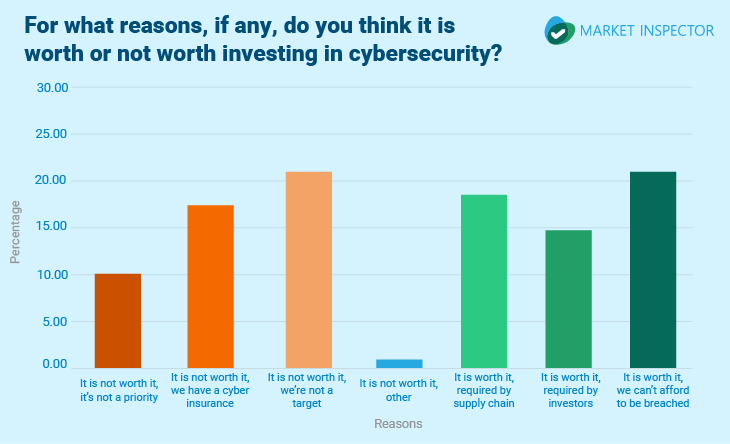
Here are some of the many reasons why prioritising cybersecurity is crucial for UK small businesses in {{this year}}:
Evolving threats
Cybercriminals constantly develop new tactics, and small businesses are particularly vulnerable to attacks like ransomware and phishing scams. These attacks can impair operations, result in data breaches, and damage a company's reputation.
Cybercriminals are increasingly using artificial intelligence (AI) to automate attacks and target vulnerabilities more effectively. Small businesses need to be aware of these evolving threats and ensure their security measures are robust enough to counter them.
Data protection regulations
The UK General Data Protection Regulation (GDPR) imposes strict regulations on how businesses collect, store, and use customer data. A cyberattack that compromises customer data can lead to hefty fines and reputational damage.
There are, however, clear, actionable steps that small businesses can take to improve their cybersecurity and overall position:
- Multi-factor Authentication (MFA): MFA adds an extra layer of security to login processes by requiring users to provide a second factor, such as a code from their phone, in addition to a password. As cyberattacks become more sophisticated, MFA is expected to become a standard security practice for small businesses.
- Human risk management: Many cyberattacks succeed through human error, such as falling victim to phishing emails. In the coming years, we're likely to see a greater emphasis on human risk management, with businesses investing in employee training programs to raise awareness of cyber threats and best practices for safe online behaviour.
Additional actions small businesses should consider:
- Conduct regular security audits to identify vulnerabilities in their systems.
- Implement strong password policies and enforce regular password changes.
- Invest in security software such as firewalls and anti-malware programs.
- Educate employees on best practices and how to identify phishing attempts.
- Back up data regularly to ensure they can recover from a cyberattack.
By prioritising cybersecurity and staying informed about evolving threats, UK small businesses can safeguard their valuable data, protect their customers' privacy, and ensure their continued success.
7. Employee mental health and wellbeing
The events of recent years have cast a spotlight on the importance of mental health and wellbeing in the workplace. In a study conducted by Mental Health UK, they found that 1 in 5 workers needed to take time off work due to poor mental health in the past year caused by pressure or stress.
With rising stress levels and burnout, for small businesses, fostering a culture that prioritises employee wellbeing is not just the right thing to do; it's also a strategic investment. There are some key reasons why this should be prioritised.
Studies show a strong link between employee mental health and job performance. Happy and well-supported employees are more engaged, productive, and less likely to leave their jobs. This translates to lower turnover costs and a more stable workforce.
A positive and supportive work environment also fosters creativity and innovation. When employees feel valued and their mental well-being is a priority, they're more likely to take risks, share ideas, and contribute to the company's success.
Stress and mental health issues can lead to increased absenteeism and higher healthcare costs for both employees and employers. By investing in preventive measures and mental health support, businesses can reduce these costs and create a healthier workforce.
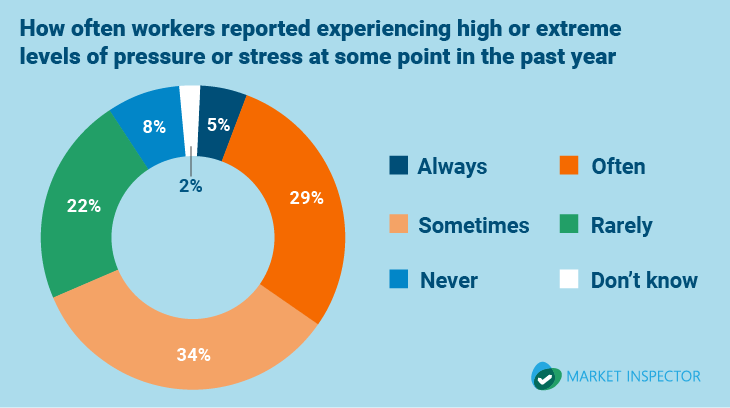
Here's how small businesses in the UK can prioritise employee mental health and wellbeing in 2025:
- Promote a culture of openness: Encourage open communication about mental health and create a safe space for employees to discuss their concerns without judgement.
- Offer flexible work arrangements: Flexible work schedules, remote work options, and paid time off can significantly reduce work-life stress and improve employee well-being.
- Provide resources and support: Offer access to mental health resources such as Employee Assistance Programmes (EAPs) or online therapy platforms. Additionally, consider training managers to identify signs of stress and burnout in their teams.
- Promote a healthy work-life balance: Discourage working long hours and encourage employees to take breaks and disconnect after work hours. This helps foster a healthier work-life balance and prevent burnout.
- Lead by example: Leaders are crucial in setting the tone for mental health awareness. By openly discussing mental health and prioritising their well-being, leaders can inspire their teams to do the same.
Investing in employee mental health is no longer just the "right thing to do"; it's a smart business decision. By creating a supportive work environment and prioritising employee wellbeing, UK small businesses can reap significant benefits, from improved employee retention and performance to a more positive and productive work culture.
8. Google's Search Generative Experience (SGE)
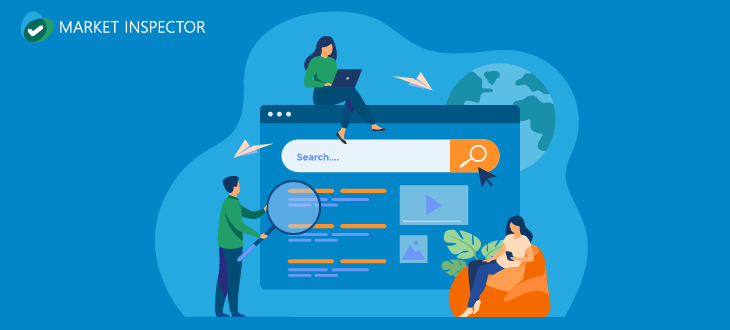
Google's Search Generative Experience (SGE) is a revolutionary tool that can be a game-changer for small businesses looking to improve their online presence. SGE uses artificial intelligence (AI) to provide users with more comprehensive and informative search results. Instead of just displaying links, SGE can offer:
- AI-powered summaries of relevant webpages, providing users with a quick overview of the information they seek.
- Helpful insights and considerations related to the search query allow users to make informed decisions.
- Dynamic responses that adapt based on the user's intent and search history offer a more personalised search experience.
These additional features can mean a range of new benefits for small businesses, including:
Increased visibility
By optimising your website content for SGE, you can improve the chances of your business appearing in those AI-generated summaries. This can lead to increased organic traffic and brand awareness.
Enhanced user experience
If your website provides valuable and informative content, SGE can help potential customers find the information they need quickly and easily. This can lead to higher conversion rates and customer satisfaction.
Staying ahead of the curve
By understanding and utilising SGE, your small business demonstrates a commitment to innovation and staying up-to-date with the latest search trends. This can position your brand as a forward-thinking leader in your industry.
Here are some tips for optimising your website for SGE:
- Focus on high-quality, informative content that addresses the specific needs and pain points of your target audience.
- Use relevant keywords throughout your website content, but avoid keyword stuffing.
- Ensure your website is mobile-friendly, as SGE is increasingly used on mobile devices.
- Track your website's performance in SGE results and adapt your strategy accordingly.
While SGE is still in its early stages, it has the potential to impact the way people search for information online significantly. By understanding and leveraging this innovative technology, UK small businesses can gain a competitive edge and thrive in the ever-changing digital landscape.
9. The rise of generative AI
Another predicted trend is that more small businesses will adopt the use of generative AI. This is a branch of artificial intelligence focused on creating entirely new content. It’s thought that 77% of the world's businesses are either using AI or exploring ways to use it.
While its potential benefits for small businesses are vast, navigating its drawbacks will also be crucial in the coming years. Below are some pros and cons that will need to be considered:
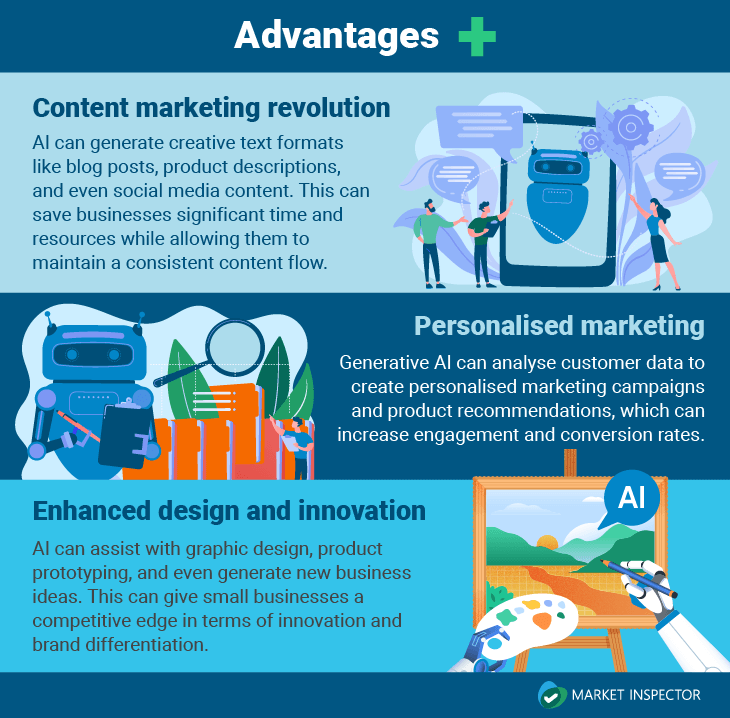
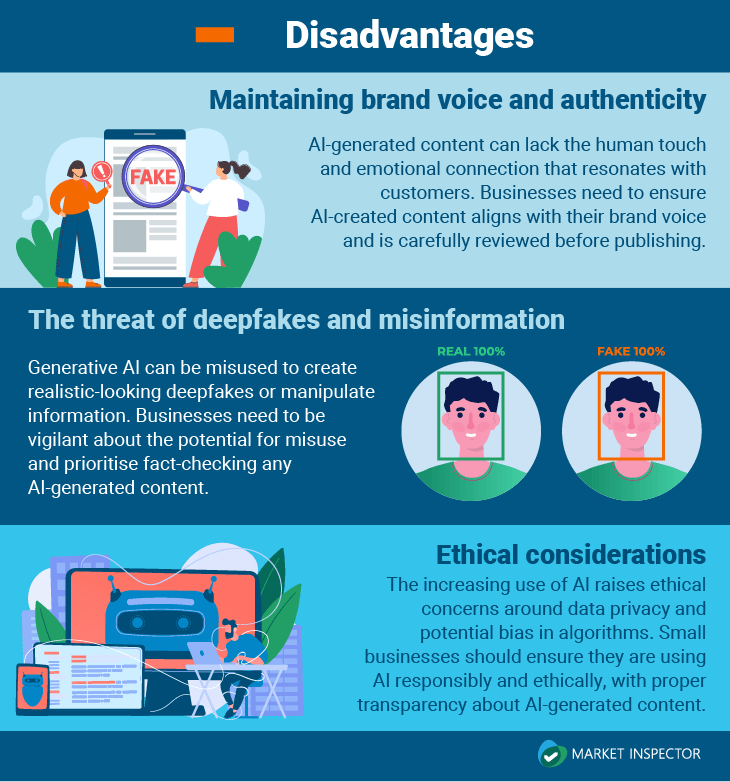
For small businesses, the key to navigating generative AI is using it as a tool rather than a replacement for human creativity and oversight. This can be achieved with a few simple actions:
-
Focus on AI-assisted content creation
Leverage AI for brainstorming, generating initial drafts, or optimising content for search engines. Maintain human control over the final product and ensure it aligns with your brand voice.
-
Prioritise transparency
Inform customers about the use of AI-generated content and maintain clear communication about the human role in content creation.
-
Stay informed about AI developments
Keep up with the latest advancements and ethical considerations surrounding generative AI to make informed decisions about its use in your business.
By embracing generative AI trends strategically and responsibly, UK small businesses can unlock their potential for enhanced creativity, content creation efficiency, and improved customer engagement. However, remaining vigilant about the potential drawbacks and maintaining a human-centric approach will be crucial for success in this evolving technological landscape.
10. Nano and micro-influencer marketing
Influencer marketing has been a steady growth trend since the rise of social media, but the giants of the online world aren’t always the way to go. In 2025, it’s predicted that small businesses will turn to nano and micro-influencers to reach their target audiences - but why?
- Nano-influencers (less than 10,000 followers) and micro-influencers (10,000 - 100,000 followers) often have highly engaged communities built on trust and genuine connection. Their audiences view them as relatable and authentic, leading to a higher level of trust and receptiveness to their recommendations.
- According to the Digital 2024: United Kingdom report, Brits spend more time on TikTok than any other country in the world - 49 hours and 29 minutes a month on the platform! With such intense use, TikTok marketing alone is a great opportunity for growth.
- Unlike mega-influencers with broad appeal, nano and micro-influencers tend to specialise in specific niches. This allows small businesses to partner with influencers who perfectly align with their target audience and brand message.
- Partnering with nano and micro-influencers is significantly more cost-effective for small businesses than with mega-influencers, who command hefty fees. This allows them to stretch their marketing budgets further and collaborate with multiple influencers for wider reach.
- According to data published this year, 69% of purchases in the UK are made online with a smartphone. Making online marketing, particularly via social platforms, particularly effective.
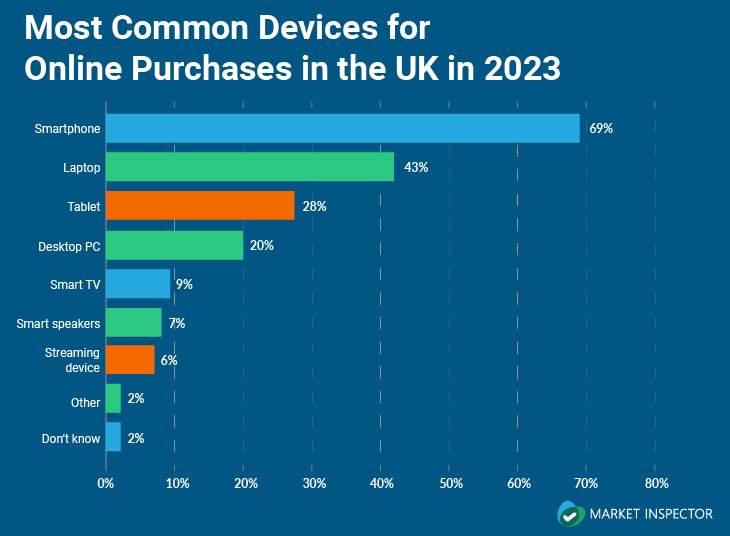
Some examples of successful Nano/Micro-influencer marketing include:
- A local bakery partners with a food micro-influencer with a strong following of home bakers to showcase their products and recipes.
- A sustainable clothing brand collaborates with a nano-influencer known for eco-conscious fashion choices to promote its latest collection.
- A fitness studio teams up with a micro-influencer who focuses on yoga and wellness to host a sponsored class and giveaway.
Nano and micro-influencer marketing offers a powerful and cost-effective way for UK small businesses to connect with their target audience and achieve marketing goals. By prioritising authenticity, niche targeting, and strategic partnerships, small businesses can leverage the power of these rising stars in the influencer marketing landscape.
11. Pay transparency
In today's competitive job market, transparency is key to attracting and retaining top talent. Pay transparency will be a strategic advantage for UK small businesses in 2025. Here's how open communication about compensation can benefit businesses.
- In a world where salary expectations are readily available online, businesses that advertise salary ranges or pay bands are seen as more transparent and trustworthy by potential candidates. This can give them a significant edge when attracting top talent.
- Open communication about pay helps ensure employees feel valued and compensated fairly. When employees understand how their pay is determined and see internal pay structures, it fosters a sense of trust and reduces the risk of pay inequities based on gender, race, or other factors.
- Transparency around compensation empowers employees to understand their career paths and opportunities for salary growth. This can increase motivation, engagement, and loyalty towards the company.
There's a spectrum of pay transparency, however, and businesses can choose the approach that best aligns with their culture and comfort level. This can range from full salary disclosures, defining ‘pay bands’ or offering a general pay range for certain positions.
Making the shift to pay transparency requires careful planning. Before going public, businesses need to analyse their internal pay structures and address any existing inequities. They also need to develop a clear communication plan to explain pay transparency policies to current and future employees, and train managers to discuss compensation openly.
While some concerns exist about pay transparency, such as potential salary negotiations or employee dissatisfaction, the overall benefits outweigh the drawbacks. By embracing pay transparency thoughtfully and strategically, small UK businesses can create a more attractive workplace, build trust with employees, and gain a competitive edge in the talent market.
12. Sector-specific insights
The overall trends outlined above provide a strong foundation for UK small businesses to navigate the evolving landscape in 2025. However, to truly thrive, it's crucial to understand the specific opportunities and challenges within the relevant business sector. Here are some insights for a few key sectors:
Retail

- Retailers need to provide a seamless customer experience across online and physical stores. Invest in click-and-collect options, mobile shopping apps, and social media integration.
- As online shopping becomes more commonplace, physical stores must offer a unique and engaging experience. Think pop-up shops, in-store events, and personalised customer service.
- Consumers are increasingly eco-conscious. Focus on sustainable practices like eco-friendly packaging, locally sourced products, and energy-efficient operations.
Professional services

- Adapt your business model to cater to a remote or hybrid workforce. Invest in collaboration tools and cloud-based solutions to ensure seamless communication and project management.
- Stand out from the competition by specialising in a niche area of expertise. This allows you to attract clients seeking specific solutions and command premium fees.
- Establish yourself as a thought leader by creating valuable content like blog posts, webinars, and ebooks. This helps attract new clients and build trust with potential customers.
Hospitality and tourism

- Embrace online booking platforms, mobile apps, and virtual reality experiences to showcase your offerings and attract tech-savvy travellers.
- Offer customised travel packages and experiences that cater to individual preferences.
- Highlight your commitment to sustainable practices like eco-friendly lodging options and responsible tourism initiatives.
Food and beverage

- Invest in online ordering platforms and delivery services to cater to the growing demand for convenient dining options.
- Consider self-ordering kiosks, digital menus, and loyalty programs to enhance the customer experience.
- Highlight fresh, locally sourced ingredients and seasonal menus to attract customers who value quality and sustainability.
Embracing change and staying ahead
The small business landscape is constantly evolving. By staying informed about emerging trends, from automation tools to community engagement strategies, small businesses can position themselves for success.
Embracing new technologies, adapting to changing consumer habits, and prioritising areas like cybersecurity will be crucial for navigating the exciting future ahead. Remember, the agility and adaptability that define many small businesses are their greatest strengths. By leveraging these strengths and staying ahead of the curve, small businesses can continue to be the backbone of the global economy.

Becky is an experienced content writer at Market Inspector with a background in broadcasting and journalism. Her passion for research and keen eye for detail means she always brings the latest and most reliable content to our readers. Key focus areas for Becky include business trends and statistics, renewable technology and sustainability. Her content has been featured on sites including The Next Web, Earth911 and the Daily Mail.
We strive to connect our customers with the right product and supplier. Would you like to be part of Market Inspector?

- UK Small Business Trends 2025
- Embracing technology
- Remote work and hybrid work
- E-commerce and digital sales
- Sustainability and environmental responsibility
- Business growth and statistics
- Cybersecurity for small business
- Employee mental health and wellbeing
- Google's Search Generative Experience (SGE)
- The rise of generative AI
- Nano and micro-influencer marketing
- Pay Transparency
- Sector-specific insights
- Embracing change and staying ahead



